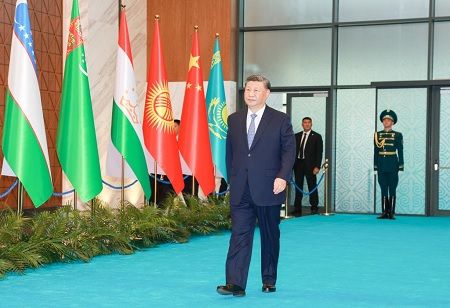-
- China and Central Asian countries agreed to deepen cooperation in education by setting up university branches, cultural centers, and Luban Workshops to train skilled talent.
- At the second China-Central Asia Summit, leaders signed key documents including a treaty on eternal friendship and launched education and trade cooperation centers.
- President Xi Jinping emphasized building a China-Central Asia community with a shared future, highlighting mutual respect, trust, and development through high-quality partnerships.
Chinese President Xi Jinping called for advancing high-quality Belt and Road cooperation and building a China-Central Asia community with a shared future during his keynote speech at the second China-Central Asia Summit, held in Astana, Kazakhstan. Hosted by Kazakh President Kassym-Jomart Tokayev and attended by the Presidents of Kyrgyzstan, Tajikistan, Turkmenistan, and Uzbekistan, the summit marked a significant step in strengthening regional cooperation.
Xi highlighted the achievements made since the first summit held in Xi’an two years ago, where the 'Xi'an Vision' was outlined. He emphasized that China and Central Asian countries have since made substantial progress in deepening their collaboration, with many consensus-driven actions now being implemented. Xi pointed to the steady expansion of the Belt and Road Initiative in the region, which has brought tangible outcomes across infrastructure, trade, and people-to-people exchanges.
He stated that the cooperation between China and Central Asia is rooted in more than 2,000 years of historical exchanges, strengthened over the past three decades of diplomatic ties, and now driven by mutual benefit and openness. Xi defined the 'China-Central Asia Spirit' as mutual respect, mutual trust, mutual benefit, and mutual assistance principles that have guided their joint pursuit of modernization and development. He urged that this spirit be upheld and allowed to shine across generations.
During the summit, Xi emphasized the need for all six countries to stay united and support each other, and proposed the signing of a treaty on eternal good-neighborliness, friendship, and cooperation. The treaty, he said, would enshrine the idea of everlasting friendship into law and serve as a new milestone in the region’s diplomatic history. He reaffirmed China’s position that Central Asia remains a top priority in its neighborhood diplomacy.
Xi also proposed optimizing the regional cooperation framework to make it more results-oriented and integrated. He announced that 2025 and 2026 would be designated as the 'Years of High-Quality Development of China-Central Asia Cooperation'. Key focus areas would include trade, industrial investment, green mining, agricultural modernization, and people-to-people exchanges. He unveiled plans to establish three cooperation centers—for poverty reduction, education exchange, and desertification control as well as a trade platform to ensure smooth commercial activity. China would also offer 3,000 training opportunities to Central Asian countries over the next two years.
Addressing regional security, Xi called for deeper cooperation to combat terrorism, extremism, separatism, and organized crime. He reiterated China's willingness to assist Central Asian countries in safeguarding cybersecurity and biosecurity to maintain regional peace and stability.
In addition, Xi advocated for enhancing mutual understanding through cultural and educational exchanges. He encouraged deeper ties between legislatures, political parties, youth, media, and think tanks, and expressed China’s readiness to open more cultural centers, university branches, and vocational training facilities across Central Asia.
On the global front, Xi reiterated his call for a fair international order and multipolar world structure. He warned against protectionism, hegemonism, and trade wars, emphasizing the need to uphold the UN-centered international system and the outcomes of World War II. Xi emphasized that only through unity, mutual respect, and win-win cooperation could humanity avoid repeating the mistakes of the past and ensure peaceful global development.
The Central Asian leaders welcomed Xi’s proposals and hailed China as a trusted strategic partner. They acknowledged the China-Central Asia mechanism as an increasingly important platform for regional cooperation, especially at a time when the world faces growing instability. They praised China’s role in promoting mutual respect and shared prosperity and expressed their intent to enhance cooperation in key areas such as infrastructure, energy, agriculture, and scientific innovation. They also supported the Belt and Road Initiative and called for expanding trade and investment ties with China.
Also Read: China Overtakes US in Global University Rankings
During the summit, the leaders signed the Astana Declaration and the treaty on eternal friendship and cooperation. A total of 12 cooperation agreements were signed, covering a range of areas including trade facilitation, green mining, customs collaboration, and infrastructure development. In a symbolic gesture of deeper ties, over 100 sister-city partnerships have now been established between China and Central Asian countries.
Xi concluded by reaffirming China’s path of openness and modernization and assured that no matter how the global situation evolves, China remains committed to fostering inclusive development and strengthening ties with Central Asia. The summit set a new benchmark for regional cooperation and laid the foundation for a future marked by deeper strategic alignment and shared prosperity.
🍪 Do you like Cookies?
We use cookies to ensure you get the best experience on our website. Read more...

